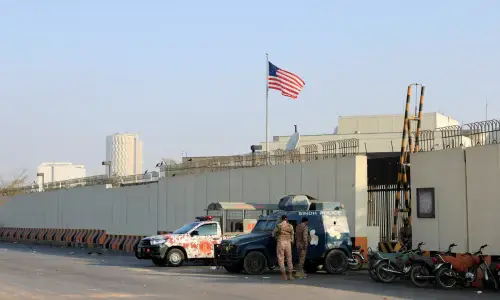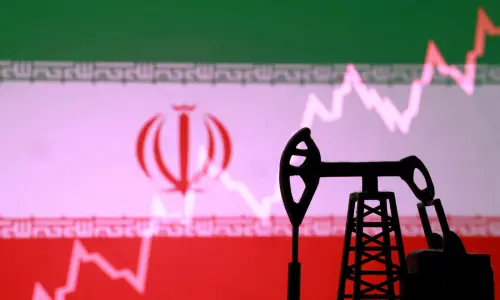When Nirmal Kumar Mukarji, the last serving Indian Civil Service (ICS) officer in India retired as Cabinet Secretary in 1980, the curtain finally came down on a Service which Pandit Motilal Nehru described in 1907 as “the greatest of the services in the world which has produced some of the most distinguished builders of the British Empire”.
Mukarji’s fellow-recruits by competitive examination in India in the last intake of the ICS in 1943 included three Muslims: Aftab Ghulam Nabi (AGN) Kazi, Agha Shahi and M. Riazuddin Ahmed. They, like a majority of the Muslim ICS, opted for Pakistan in 1947. Kazi was born in Sindh in 1919 and commenced his innings in the ICS in Bihar and Orissa. His career of over half a century made him the longest serving civil servant in Pakistan.
Hailing from Mysore, Agha Shahi was connected with the family of the Diwan, Sir Mirza Ismail. Alongside his brother, Agha Hilaly (ICS, 1936), he was a pillar of Pakistan’s foreign service establishment and became Foreign Secretary in 1973.
The movement of the Muslim ICS towards alignment with the Muslim League and the demand for Pakistan developed gradually. While, on the whole, the Muslim ICS had never been pro-Congress, they were neither predominantly pro-Muslim League until 1945-46 when Indian politics polarised sharply. By the end of 1946, most ICS Indians in the Central Government were either pro-Congress or pro-Muslim League.
Ironically enough, the Pakistan protagonists in the senior bureaucracy on the eve of transfer of power were led by the Audit and Accounts Service, chiefly Chaudhri Muhammad Ali, a finance officer of exceptional merit and integrity who was appointed the first Secretary-General of the Government of Pakistan, becoming Finance Minister in 1951 and Prime Minister in 1955-56.
By virtue of the pre-eminent position of the ICS in the governance of colonial India, this elite group soon established its grip over the administration. It was assisted by European officers who opted for Pakistan in numbers higher than in India. While Pakistan remained considerably short of manpower, those who were available were imbued with the British administrative tradition and quickly replicated it, down to the strict recruitment standards and high-quality training institutions.
At Partition, three of the four provincial governors were ICS Europeans: Sir Francis Mudie (Punjab), Sir Frederick Bourne (East Bengal) and Sir George Cunningham (NWFP). In 1950, seven of the top civilians in Pakistan were still European.
Mohammed Ikramullah (ICS, CP & Berar) served with distinction as the first Foreign Secretary. His wife, Begum Shaista Suhrawardy Ikramullah, an accomplished author and essayist, was active in the Muslim League and was one of the two women representatives in the Constituent Assembly of Pakistan. Aziz Ahmed, the first Chief Secretary in the eastern wing, was also Foreign Secretary; the other ICS Foreign Secretaries included J.A. Rahim, Mirza Sikandar Ali Baig and S.K. Dehlavi, (ICS, Bihar, 1938).
An outstanding civil servant, Akhter Husain received his early education at the Hakimia High School, Burhanpur (Central Provinces) and graduating from the Allahabad University, he entered the ICS becoming Chief Secretary in the undivided Punjab in 1946-47, Secretary, Ministry of Defence, Governor of West Pakistan and a Federal Minister.
The Muslim ICS who opted for Pakistan came from virtually every province of British India; these included A.T. Naqvi, S. Ghias-ud-Din Ahmed, H.A. Majid, Syed Fida Hasan, M.R. Kayani, S.H. Raza, Abdul Majeed, Naseer Ahmad Faruqui, Mirza Muzaffar (M M) Ahmad, Shaikh Nazrul Bakar (originally of the Bihar cadre, he had to retire prematurely because of a clash with Aziz Ahmed who emerged as the Deputy Chief Martial Law Administrator in 1958), Shahabuddin Rahmatullah, Asghar Ali, M.M. Niaz, Qamar-ul-Islam and Qudratullah Shahab.
Kayani (ICS, Punjab, 1927) was the Chief Justice of West Pakistan from 1958 to 1962. He was not elevated to the Supreme Court because of his open criticism of the military authorities.
Ghulam Mueenuddin, (ICS, Punjab, 1930) was Secretary of the Establishment Division and, later, the Chief Election Commissioner. He was a principal negotiator of the Indus Waters Treaty (1960) and is the father of Daniyal Mueenuddin, the Pakistani-American author of the widely acclaimed short story collection “In Other Rooms, Other Wonders”.
M.M. Ahmad joined the ICS in 1939 and, at one stage of his career, was arguably the most influential civil servant in Pakistan with supervisory authority over three ministries.
Four Chief Justices of the Supreme Court of Pakistan had their origins in the ICS, namely, Muhammad Shahabuddin (1960), A.R. Cornelius (1960-68), S.A. Rahman (1968) and Sheikh Anwarul Haq (1977-81). Justice Shahabuddin (ICS, 1921) was born in Ellore (Madras) and was a Judge of the High Court there; after Partition, he was appointed as a Judge of the Dacca High Court. Justice Cornelius entered the ICS in 1926 and was a Judge of the Lahore High Court. Post-1947, he was a founding father of Pakistan cricket and is the recipient of Hilal-i-Pakistan.
On the other hand, there were amongst others, Sahibzada Khurshid Ahmed Khan, Chief Commissioner, Delhi in 1947 and son of a co-founder of the AMU and Syed Hasan Zaheer (son of Sir Wazir Hasan who was President of the All India Muslim League in 1936) opted for India. In the Punjab cadre, two Muslim ICS, BFHB Tyabji (of the family of the first Muslim President of the Indian National Congress, a Sulaimani Bohra) and M. Azim Hussain (son of Sir Fazle Hussain) chose to serve in India while Cornelius and Burke, both Indian Christians, opted for Pakistan.
Till he died at the age of 104, Samuel Martin Burke (1906-2010) was an ICS officer who outlived many others. He belonged to the 1930 batch and later quit the ICS but was recalled by the Quaid-i-Azam Mohammad Ali Jinnah to join the foreign service.
Then there was Dr Akhtar Hameed Khan (1914-1999) who is widely credited with pioneering micro-credit initiatives, farmers’ cooperatives and rural training programmes in the developing world. A son-in-law of Allama Mashriqi, his particular contribution was the establishment of a comprehensive project for rural development, the Comilla Model (1959) which earned him the Ramon Magsaysay Award.
The eighty-one ICS officers who opted for service in Pakistan helped immeasurably in providing an administrative structure which kept things going in the early years. Many of them were from northern India or from the Bengal cadre of the ICS and formed the core of a new central service called the Pakistan Administrative Service (PAS) which was later rechristened as the Civil Service of Pakistan (CSP).
In August, 1973, Prime Minister Z. A. Bhutto unveiled civil service reforms, saying that a new system was being put in place in which all services and cadres, including the remaining ICS officers and their successors in the CSP, would be merged into one service with equality of opportunity for all. It is interesting to note that a founding member of the Pakistan People’s Party was an ICS man, Jalaluddin Abdur (JA) Rahim whose German-born wife, Esther Rahim, was a well-known painter and contributed significantly to the setting up of the Karachi Arts Council.
The writer joined the Indian Administrative Service in 1966 and retired as Secretary, Government of India bhatnagar66@gmail.com































